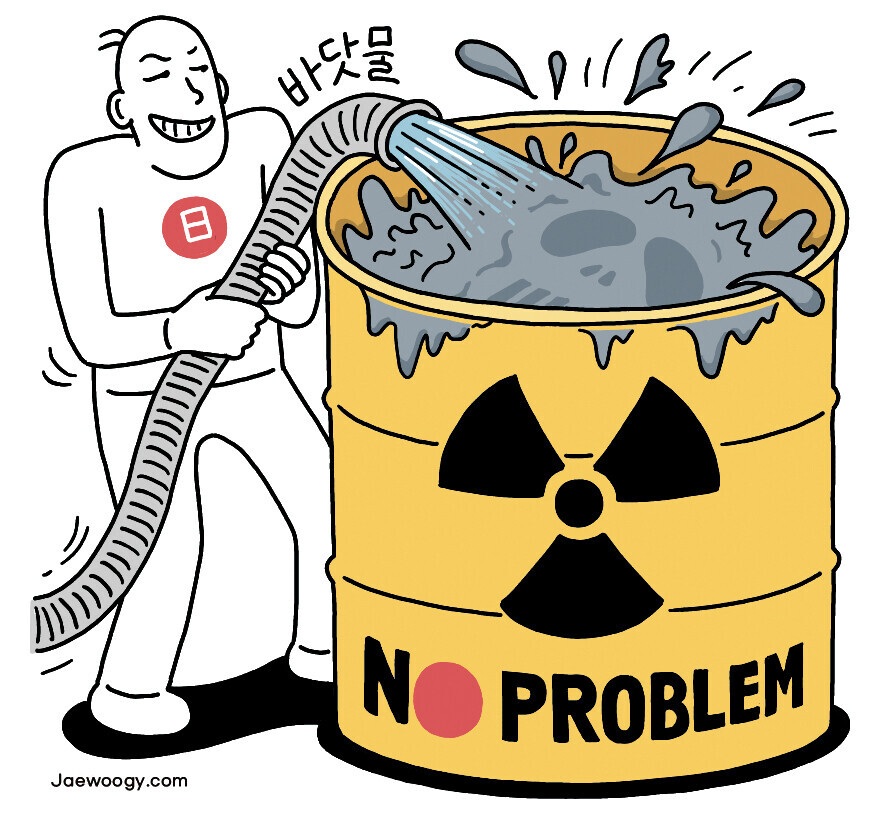hankyoreh
Links to other country sites 다른 나라 사이트 링크
[Column] Diluting Fukushima water is just a charade

There was once a man selling “rabbit burgers.” When a customer asked if the patties were 100% rabbit meat, he said he’d mixed in a little horsemeat. Upon further questioning, the man explained that he’d mixed the two meats at a one-to-one ratio. When the customer asked if this meant that, for example, the patties were made with 1kg of rabbit meat and 1kg of horsemeat, the man admitted that he’d used a ratio of one rabbit to one horse.
So would that be a rabbit burger or a horse burger? The reason governments regulate the ingredients listed in food products is to ban this kind of duplicity or at least make it obvious.
There are also tolerated limits for releasing pollutants. In the case of phenol (the chemical involved in a serious incident of pollution in the Nakdong River in March 1991), companies can release 0.1mg in each liter of liquid.
That means that 1g of phenol could be released after diluting in at least 10,000 liters of water. But since it’s not easy to acquire large amounts of the fresh water needed for diluting, this rule restricts indiscriminate dumping of such chemicals in rivers and lakes. That’s why those bent on mischief wait for torrential rain before going about their nefarious deeds.
There are also limits for releasing pollutants into the ocean, but those limits are practically meaningless. Given the abundance of ocean water, it’s quite easy to pump up seawater, use it to dilute chemicals, and then release it back into the ocean.
97% of the water on the planet is seawater. That’s enough to fill 13.6 billion tanks, assuming that each tank has a storage capacity of 100 million tons.
As a result, it’s not very difficult to dilute a pollutant to one-fortieth — or even one-forty-thousandth — of the safe limit. That’s why the Japanese government has promised to dilute the radioactive water from the Fukushima nuclear reactor to “the level of a soft drink” before releasing it into the ocean.
Looking at the amount of radioactive material that Japan means to dump into the ocean, one struggles to justify Japan’s plan and the nuclear power industry itself. A lot of tritium is released from South Korea’s Wolseong nuclear power plant, which uses heavy water, and the same is true of nuclear plants in the US and China.
In 2015 — in one year — France’s reprocessing facility for spent nuclear fuel released 15 times as much tritium into the ocean as is contained in all the contaminated water at Fukushima. We’re simply falling for a charade about diluting the tritium with seawater.
Japan has been storing the water contaminated in the Fukushima accident to keep it from flowing into the ocean. It would be irresponsible and immoral for Japan to dump that water into the ocean now.
Japan has a number of other options, including solidification, delayed release, and burying underground. But Japan has chosen seawater dilution because that’s the cheapest option.
By Jeong Nam-ku, editorial writer
Please direct comments or questions to [english@hani.co.kr]
Editorial・opinion
![[Column] When ‘fairness’ means hate and violence [Column] When ‘fairness’ means hate and violence](https://flexible.img.hani.co.kr/flexible/normal/500/300/imgdb/original/2024/0516/7417158465908824.jpg) [Column] When ‘fairness’ means hate and violence
[Column] When ‘fairness’ means hate and violence![[Editorial] Yoon must stop abusing authority to shield himself from investigation [Editorial] Yoon must stop abusing authority to shield himself from investigation](https://flexible.img.hani.co.kr/flexible/normal/500/300/imgdb/original/2024/0516/4417158464854198.jpg) [Editorial] Yoon must stop abusing authority to shield himself from investigation
[Editorial] Yoon must stop abusing authority to shield himself from investigation- [Column] US troop withdrawal from Korea could be the Acheson Line all over
- [Column] How to win back readers who’ve turned to YouTube for news
- [Column] Welcome to the president’s pity party
- [Editorial] Korea must respond firmly to Japan’s attempt to usurp Line
- [Editorial] Transfers of prosecutors investigating Korea’s first lady send chilling message
- [Column] Will Seoul’s ties with Moscow really recover on their own?
- [Column] Samsung’s ‘lost decade’ and Lee Jae-yong’s mismatched chopsticks
- [Correspondent’s column] The real reason the US is worried about Chinese ‘overcapacity’
Most viewed articles
- 1China calls US tariffs ‘madness,’ warns of full-on trade conflict
- 2[Column] US troop withdrawal from Korea could be the Acheson Line all over
- 3[Editorial] Yoon must stop abusing authority to shield himself from investigation
- 4[Column] When ‘fairness’ means hate and violence
- 5[Column] How to win back readers who’ve turned to YouTube for news
- 6US has always pulled troops from Korea unilaterally — is Yoon prepared for it to happen again?
- 7[Book review] Who said Asians can’t make some good trouble?
- 8Naver’s union calls for action from government over possible Japanese buyout of Line
- 9Could Korea’s Naver lose control of Line to Japan?
- 10[Editorial] Korea must respond firmly to Japan’s attempt to usurp Line